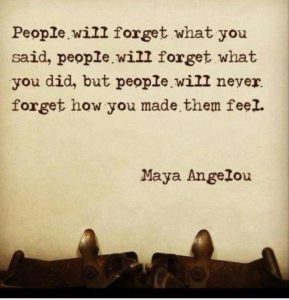[vc_row][vc_column][vc_column_text]
Written by Robert Keft, 12 May 2016
I remember years ago on a popular TV show that this expression was said in a joking manner but I am starting to believe in the business world that it is increasingly becoming true.
Basic common courtesy should be a fundamental part of our day to day life, but I continue to be astonished that there are some people that think common courtesy is optional extra in their work life.
Have we become so lazy that we feel it is ok to ignore a call or email request from someone we know or are we so time poor that we don’t have the time to return calls and emails? I guarantee most people would ‘find’ the time if they knew the other person was calling to advise that you had won a large sum of money.
This ‘time poor’ behaviour is even encroaching into meetings. How often has someone left you waiting an inordinate amount of time when an appointment has been set or worst still not even bothering to turn up for the meeting at all! Why is your time so much more valuable than mine?
Treat others how you want to be treated
A pretty simple philosophy in life but I continue to see people letting their colleagues down by not delivering the quality of product or service that you know the person is capable of, or just simply not completing a piece of work that someone was depending on. ‘I’m sorry, I didn’t get a chance to do it’, is that because your time is more valuable than mine?
Extreme behaviour such as deliberately undermining colleagues for self-gain, having an attitude of superiority and utilising power to humiliate others or practising poor values which would horrify the person if they were subject to the same poor values themselves is moving beyond lack of courtesy and into destructive behaviour.
Throughout my corporate career I have seen many forms of destructive behaviour and just pure lack of common courtesy and I could go on and on. But the real question is what causes this type of behaviour? I believe there a 2 key enablers of these forms of behaviour.
1. ARROGANCE
As D P Harrop said “Never mistake arrogance for intellect”.
Arrogance among Leaders especially will bring a company down every time. Let’s be straight, arrogance can be easily detected by suppliers, clients and work colleagues alike.
Nearly every time I see a larger company in trouble from a performance perspective I would suggest that arrogance is one of the key contributors. It often starts at the top of an organisation and has the ability to permeate through the organisation’s structure.
I am sure you can think of many companies that both in the past and currently that suffer terribly for arrogance. I was horrified recently when I walked into a Corporation’s Foyer to see a list of suppliers that they no longer liked, proudly presented for all visitors to see.
Have they ever thought I “how are we treating our suppliers” and how do they think that embarrassment and belittling them will build a better relationship with their suppliers? The culture that has developed this arrogance towards suppliers will undoubtedly also affect their own work colleagues and potentially in time their investors. In short, no one wins when arrogance abounds. Being humble but still proud of one’s achievements, is undoubtedly one of the greatest of qualities that a person can possess.
2. A SENSE OF ENTITLEMENT
“Successful people have a sense of gratitude, unsuccessful people have a sense of entitlement”. – Steven Aitchison.
I hear far too often people sending out the message me, me me!!! It’s all about me and not about what I can do to benefit the lives of others. When we recently changed our company’s motto to “we save lives” I initially thought it was way too out there. But then I started to hear of occurrences of when our work colleagues actually did prevent a serious accident from occurring or directly intervened to save a life. This gave our business so much more meaning, than just being a good place to work, to do business with and to invest.
From my perspective it is so important to actively practise empathy and respect for others. From what I observe many people say they are empathic but have little understanding of how their behaviours can impact on others. We all need to increase our self-awareness and treat others with the respect and courtesy that they deserve. In my experience some of the most difficult people I have dealt with in my working life had a high sense of entitlement and very little understanding of how that affected the people around them. With regards to Leaders the impact has the potential to be much worse and can infect the organisation. Over time I have no doubt that this attitude is detected by colleagues and results in behaviours that can be considered unkind, discourteous and disrespectful.[/vc_column_text][/vc_column][/vc_row]

 Safety Australia Group
Safety Australia Group